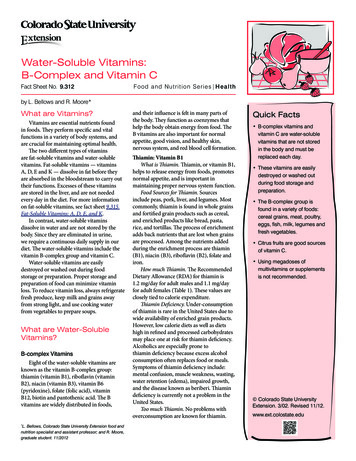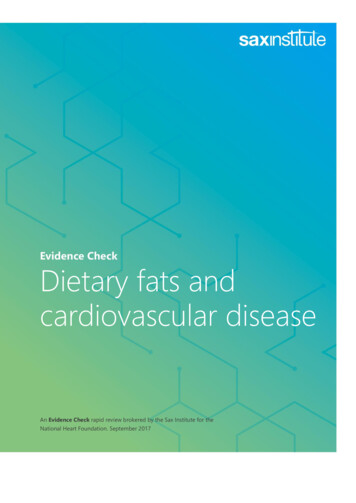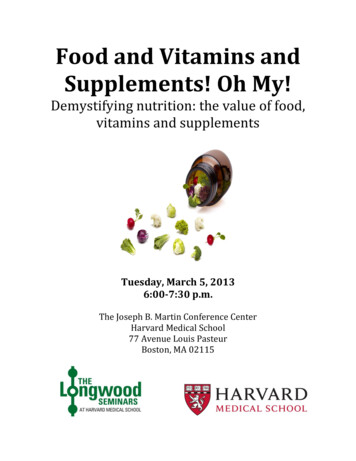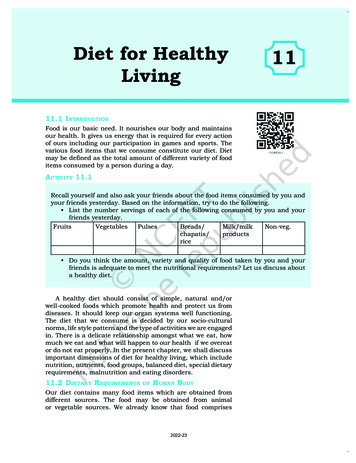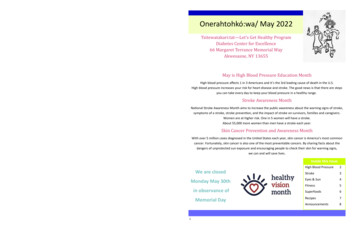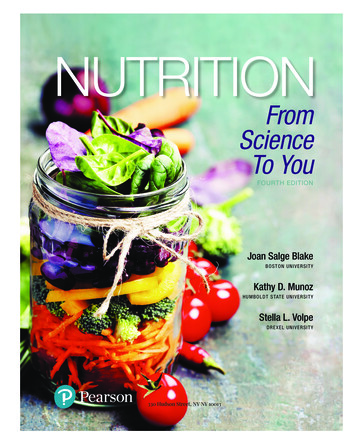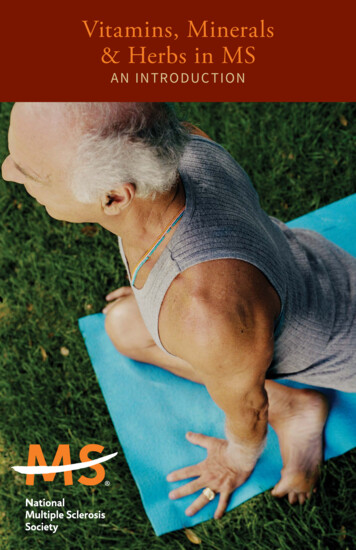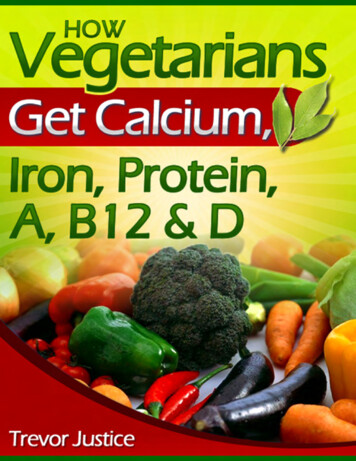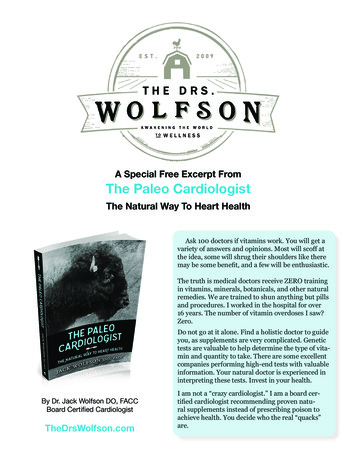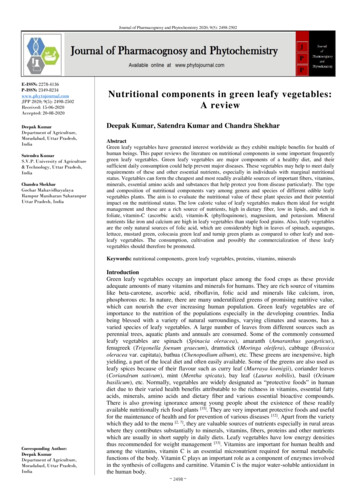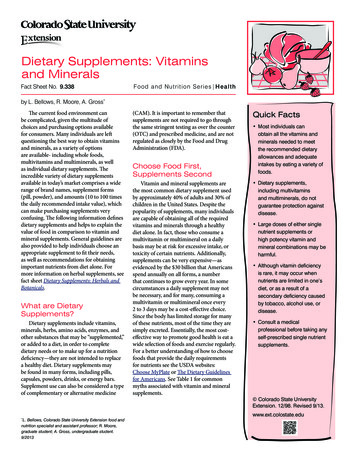
Transcription
Dietary Supplements: Vitaminsand MineralsFact Sheet No. 9.338Food and Nutrition Series Healthby L. Bellows, R. Moore, A. Gross*The current food environment canbe complicated, given the multitude ofchoices and purchasing options availablefor consumers. Many individuals are leftquestioning the best way to obtain vitaminsand minerals, as a variety of optionsare available- including whole foods,multivitamins and multiminerals, as wellas individual dietary supplements. Theincredible variety of dietary supplementsavailable in today’s market comprises a widerange of brand names, supplement forms(pill, powder), and amounts (10 to 100 timesthe daily recommended intake value), whichcan make purchasing supplements veryconfusing. The following information definesdietary supplements and helps to explain thevalue of food in comparison to vitamin andmineral supplements. General guidelines arealso provided to help individuals choose anappropriate supplement to fit their needs,as well as recommendations for obtainingimportant nutrients from diet alone. Formore information on herbal supplements, seefact sheet Dietary Supplements: Herbals andBotanicals.What are DietarySupplements?Dietary supplements include vitamins,minerals, herbs, amino acids, enzymes, andother substances that may be “supplemented,”or added to a diet, in order to completedietary needs or to make up for a nutritiondeficiency—they are not intended to replacea healthy diet. Dietary supplements maybe found in many forms, including pills,capsules, powders, drinks, or energy bars.Supplement use can also be considered a typeof complementary or alternative medicineL. Bellows, Colorado State University Extension food andnutrition specialist and assistant professor; R. Moore,graduate student; A. Gross, undergraduate student.9/2013*(CAM). It is important to remember thatsupplements are not required to go throughthe same stringent testing as over the counter(OTC) and prescribed medicine, and are notregulated as closely by the Food and DrugAdministration (FDA).Choose Food First,Supplements SecondVitamin and mineral supplements arethe most common dietary supplement usedby approximately 40% of adults and 30% ofchildren in the United States. Despite thepopularity of supplements, many individualsare capable of obtaining all of the requiredvitamins and minerals through a healthydiet alone. In fact, those who consume amultivitamin or multimineral on a dailybasis may be at risk for excessive intake, ortoxicity of certain nutrients. Additionally,supplements can be very expensive—asevidenced by the 30 billion that Americansspend annually on all forms, a numberthat continues to grow every year. In somecircumstances a daily supplement may notbe necessary, and for many, consuming amultivitamin or multimineral once every2 to 3 days may be a cost-effective choice.Since the body has limited storage for manyof these nutrients, most of the time they aresimply excreted. Essentially, the most costeffective way to promote good health is eat awide selection of foods and exercise regularly.For a better understanding of how to choosefoods that provide the daily requirementsfor nutrients see the USDA websites:Choose MyPlate or The Dietary Guidelinesfor Americans. See Table 1 for commonmyths associated with vitamin and mineralsupplements.Quick Facts Most individuals canobtain all the vitamins andminerals needed to meetthe recommended dietaryallowances and adequateintakes by eating a variety offoods. Dietary supplements,including multivitaminsand multiminerals, do notguarantee protection againstdisease. Large doses of either singlenutrient supplements orhigh potency vitamin andmineral combinations may beharmful. Although vitamin deficiencyis rare, it may occur whennutrients are limited in one’sdiet, or as a result of asecondary deficiency causedby tobacco, alcohol use, ordisease. Consult a medicalprofessional before taking anyself-prescribed single nutrientsupplements. Colorado State UniversityExtension. 12/98. Revised 9/13.www.ext.colostate.edu
Who Should Consider aMultivitamin, Multimineral,or Individual NutrientSupplements?How Are DietarySupplementsRegulated?National food consumption data anddietary surveys show that the majority ofAmericans consume all of the nutrientsneeded, through a balanced and varieddiet that includes healthy food choices.Some nutrients, like calcium and iron, mayrequire careful food selection, but can beobtained from adequate consumption of avariety of foods. Certain individuals mayhave dietary restrictions (such as those withceliac disease or lactose intolerance), orbelong to a particular life stage (pregnant,breastfeeding, or older adult) and maybenefit from taking specific supplements.Consult a medical professional beforedeciding to take a dietary supplement. SeeTable 2 for recommendations for the typeand amount of supplement that may bebest, and Table 3 for a description of how toobtain important nutrients through food.In 1994 Congress passed the DietarySupplement Health and EducationAct (DSHEA), which clearly definessupplements as food, not drugs.Unlike drugs, supplements do notneed FDA approval before beingmarketed and sold to the public.The supplement manufacturer isresponsible for the safe consumptionof supplements and providingevidence to support health claims.However, evidence does not have tobe provided before the supplementis marketed, and the FDA will takeaction against any unsafe dietarysupplements after they reach themarket. In 2007 the FDA implementedthe Current Good ManufacturingPractices (CGMPs), which act toinsure the consistency, identity, purity,strength, and composition, of dietarysupplements.Pregnant women or women who maybecome pregnant: This population isstrongly advised to consume supplementsfor folic acid (folate), iron, or a prenatalvitamin that contains these nutrients. Folic Acid helps to prevent birthdefects of the brain and spine, and maybe obtained through fortified foods(such as enriched breads and cereals),vitamin supplements, or a combinationof both. Iron helps to increase the amountof blood in the body and helps keepblood healthy. Too iron little may leadto anemia. A prenatal vitamin may contain bothfolic acid and iron, as well as otherimportant vitamins and minerals bothmother and baby need for propernutrition (for example, vitaminB12 is important if the mother is avegetarian). Some nutrients, however,may be harmful to babies (such asvitamin A, where too much cancause birth defects), and a prenatalsupplement ensures that both motherand child are receiving healthy doses ofall nutrients.Vegetarians and vegans: This populationshould ensure adequate intake of vitaminB12, vitamin D, calcium, iron, and zinc. Vitamin B12 (cobalamin) is onlyfound naturally in foods of animalorigin such as eggs and dairy products.Before consuming any type ofsupplement, consult a medicalprofessional and research thesupplement thoroughly.The following website resourcesare provided to help one makean educated decision and identifyinaccurate information when choosinga dietary supplement:National Library of Medicine(NLM)–Dietary SupplementsLabels DatabaseCSU Extension fact sheet,Nutrition Misinformation: How toIdentify Fraud and MisleadingClaims Vegans and strict vegetarians that donot consume eggs or dairy productsshould consider taking a vitamin B12supplement.Vitamin D is found in very few fooditems, although dairy products, milkalternatives (soy or almond milk),orange juice, breakfast cereals, andeggs, may be fortified with this nutrient. Those who do not consumethese food items and do not receiveexposure to regular sunlight shouldconsider a vitamin D supplement.Calcium is mostly found in dairyproducts, therefore vegans andvegetarians who do not consume dairymay not receive enough calcium intheir diet.Iron is found in two different forms—heme iron (from animal products)is more available for absorption, andnonheme iron (from plant foods)is less available for absorption.Vegetarians and vegans may receiveenough iron from their diet, althoughif it is strictly from plant foods(nonheme sources), twice as muchdietary iron each day may be needed.Zinc is primarily found in animalproteins, therefore vegetariansand vegans may require 50% morezinc in the diet than is generallyrecommended. Additionally, beansand grains have compounds thatmay keep zinc from being absorbedas readily. For more informationregarding dietary recommendationsfor vegetarians and vegans, see factsheet Vegetarian Diets.Women with heavy menstrual bleeding:This population should consume extra iron,which acts to replace that which is lost dueto blood loss.Those with a restrictive diet (1,600calories per day or less): For mostadults, a diet that includes less than 1,600calories per day will not supply all of thenecessary vitamins and nutrients to meetthe body’s needs—and these individualsshould consume a multivitamin and/or multimineral supplement. Consult amedical professional regarding type andrecommended amount of supplement.Older adults (50 ), menopausal,and postmenopausal women: Theseindividuals should consume vitamin B12,calcium, and a vitamin D supplement.Vitamin B12, calcium, and vitamin D, worktogether to maintain healthy bones andreduce the risk for fractures. Vitamin B12 is absorbed less readilyfrom foods as one ages. Theseindividuals should receive vitaminB12 from fortified foods such asbreakfast cereals, or through a dietarysupplement. Calcium may not be absorbed as wellin older adults and this population
may experience bone loss. Acombination of calcium intake fromboth food sources and supplementalform is important.Vitamin D is not produced asefficiently in older adults uponexposure to sunlight. Additionally, theability of the kidney to convert vitaminD to a form that the body can use isalso dampened with age.Breastfed and partially breastfed infants:Since human milk is a poor source ofvitamin D, infants who are solely breastfedor drink less than 1 quart per day ofvitamin D-fortified formula or milk shouldreceive a supplemental form of vitamin D.Limited milk intake and sunlightexposure: Dairy products and sunlightexposure are two primary means ofobtaining vitamin D, therefore if eitheris limited, a supplemental form may benecessary.Health conditions that may limit nutrientuse and absorption: Those with healthconditions that may affect digestion,appetite, and limit nutrient absorption,may not be receiving adequate nutrientsfrom diet alone (examples include thosewith food allergies, physical trauma, andgluten intolerance).These populationsshould consider a multivitamin and/or multimineral supplement. Consult amedical professional regarding the type andrecommended amount of supplement.How to Choose aSupplementIt is important for healthy individualswho take vitamin or mineral supplementsto limit the potency to 100% or less ofthe Dietary Reference Intake (DRI) fortheir age, gender, and life stage (Table 2).Consuming a supplement that containsno more than 100% of the Daily Value(DV) is usually considered safe. Highpotency supplements that contain morethan 100% of the DV are not suggested.Avoid supplements that provide megadoses of any vitamins or minerals, or haveadded botanicals whose properties areunknown. Information about vitaminand mineral content can be found on thelabel of all dietary supplements. Be awareof misleading claims that promise theproduct is a “cure all” or can treat a disease.For more information on how to identifynutrition fraud, see fact sheet NutritionMisinformation: How to Identify Fraud andMisleading Claims.The term natural on a supplementis not synonymous with safe. Severalnatural products may cause negativedrug interactions, worsen certain healthconditions, and may be harmful at higherdoses. Do not take a supplement priorto taking prescription medications,or receiving advice from a medicalprofessional. Before choosing to take adietary supplement, consider whetherthe supplement is necessary, and possibledietary modifications that might be a betteroption (Table 3).Do Vitamin and MineralSupplements Pose aHealth Risk?Large doses of either single-nutrientsupplements or high potency vitaminmineral combinations may be harmful.These megavitamins may contain 10 toover 100 times the Dietary Reference Intake(DRI) for a vitamin or mineral and can actlike drugs with potentially serious results.Very high doses of many supplements,especially vitamins A, D, C, and B6, cancause serious health problems if takenregularly. Excess of one nutrient may causenutritional imbalances or increase the needfor other nutrients. Severe side effects suchas kidney stones, liver or nerve damage,birth defects, and even death can occurfrom 10 to over 100 times of the DRI. Taken in high amounts, somesupplements may produce undesirableeffects such as fatigue, diarrhea andhair loss. Others may cause more severe sideeffects such as kidney stones, liver ornerve damage, birth defects, or evendeath. At high levels, single-nutrientsupplements function as a drug in thebody and not as a nutrient. Fat-soluble vitamins such as vitaminsA and D are harmful in high doses. Fornon-smokers, supplements of vitaminA should contain the majority of thevitamin in the beta-carotene ratherthan the retinol form. Vitamin E mayact as a blood thinner and should notbe taken for at least one week prior tosurgery. Water-soluble vitamins are commonlythought of as harmless, however,Additional ResourcesFor more information on mineralrecommendations for age and lifestage, see the National Institutesof Health (NIH) Office of DietarySupplements website–Vitamin andMineral fact sheet.For more information on how to spota false health claim, see the FederalTrade Commission (FTC) website.For information on recent supplementalerts and safety information, see theFood and Drug Administration (FDA)website.research shows that vitamin B-6can cause nerve damage at the highdoses prescribed for pre-menstrualsyndrome (PMS). High intakes of folicacid can mask or worsen the symptomsassociated with a vitamin B-12deficiency. Large amounts of vitamin Ccan cause diarrhea and nausea. Many factors influence toxicity.Supplement potency, dose (numberand frequency), body size, and howlong the supplement is taken, allinfluence whether a supplement canbe toxic.For more information, see fact sheetWater-Soluble Vitamins: B-Complex andVitamin C, and Fat-Soluble Vitamins: A, D,E, and K.SummaryWith the increased availability and widevariety of food accessible to consumersin the United States, most individuals canreceive all of the vitamins and mineralsneeded from food alone—this uniquebalance cannot be duplicated by takingany combination of supplements. Certainindividuals that have dietary restrictions,are pregnant or breastfeeding, older than50, or with special dietary requirements,may need to supplement their diet witha multivitamin and/or multimineral, orindividual nutrient supplements. Consult amedical professional for recommendationsregarding the type and amount ofsupplement best for one’s individual needs.
Table 1. Common myths and facts regarding dietary supplements.MythFactHealthy Suggestion“Vitamin and mineralsupplements can make up foran unhealthy diet.”Supplements supply only a fraction of thenutrients needed daily, and are not a quick fixfor suboptimal food choices.Food contains important components such as phytonutrients,antioxidants, fiber, and dietary fat, which cannot be foundin supplements. Consuming whole foods will provide thesecomponents naturally, in much higher levels.“Consuming large quantitiesof supplements will lead tooptimal health.”The body will only use the vitamins andminerals that it needs. Any extra will beexcreted or may pose a risk for toxicity.Consuming more nutrients than the bodyrequires does not give added energy,increased brain power, or greater protectionagainst disease.Consult a doctor or dietitian before consuming anysupplement, and avoid consuming large quantities ofsupplements.“Supplements with addedenzymes are easier to digest.”The body makes its’ own digestive enzymesto breakdown and absorb supplements.Added enzymes are unnecessary; however, consuminglactase enzymes may be beneficial for those who are lactoseintolerant.“Timed-release supplementsaid in absorption throughoutthe day.”Timed-release supplements are costly andare not absorbed throughout the day.Supplements should be consumed when they do notcompete for absorption with other foods. Consult amedical professional regarding the type and combination ofsupplements to consume at certain times of the day.“More expensive vitamin andmineral supplements are worththe extra cost.”The cost of the vitamin does not necessarilytranslate to quality. Generic vitamins areoften as good as brand names. Vitaminsand minerals are commodity items, andevery manufacturer has access to the sameingredients. For that reason, paying morefor a brand name won’t necessarily buyyou better vitamins. Also, vitamins lose theirpotency over time and must be stored at,or below, room temperature. If bottles aresitting on a shelf in warm room or in directsunlight, they may degrade even before theirexpiration date.Consider purchasing your vitamins from well-known retailersthat restock frequently.“Taking supplements thatcontain antioxidants such asvitamin A, E, and C will preventcancer and heart disease.”Antioxidant supplements do not offerprotection against cancer or heart disease,and may even do some harm. Heartdisease, cancer, diabetes and high bloodpressure are affected by many factors, one ofwhich is eating patterns. If a variety of foodsare consumed in adequate and moderateamounts, supplements are unnecessary andwill not provide added protection.Consuming foods rich in antioxidants, such as greenvegetables, citrus fruits, deep-orange colored produce, andother fruits and vegetables have many cancer and diseasefighting properties.“Osteoporosis can beprevented by consumingcalcium supplements.”Many factors such as calcium, estrogenlevels, exercise, gender, body size,smoking, race, and genes, contribute tothe development of osteoporosis. The mosteffective treatment in postmenopausalwomen may be a combination of additionalcalcium, vitamin D, exercise, and estrogen.While calcium consumption from foods such as milk andyogurt is the best way to meet daily needs, a daily calciumsupplement with vitamin D may be beneficial if calcium intakeis below recommended levels.“Those who are sick orstressed will benefit fromvitamins.”Emotional stress does not increase nutrientneeds. Physiological stress such as burns,trauma, and surgery, do increase nutrientneeds, and a supplement may be prescribed.Individuals who are sick or stressed should aim for a healthfulbalanced diet with adequate intake of all recommendedvitamins and nutrients. Additionally, research shows that 30minutes of exercise for 5 days out of the week is an importantpart of a healthy lifestyle, and acts to combat the effects ofstress on the body.“Those who smoke or consumealcohol in excess should takevitamins to protect their bodyfrom the harmful effects ofsmoking and drinking.”Smoking will increase the body's need forvitamin C, and alcohol can interfere withthe body's ability to utilize several nutrients.However, taking additional vitamins andminerals will not protect people from theharmful effects of smoking or alcohol abuse.Individuals who smoke or drink alcohol in excess should speakto a medical professional who will provide resources to help onediscontinue these harmful behaviors.
Table 2. How to choose a vitamin or mineral supplement. The following list includes the recommended daily instakes of important vitamins andminerals for certain populations at greatest risk for deficiency.SupplementWhich Form?Daily Recommended Intake(Dietary Reference Intakes—DRI)Calcium: Important for women whoare pregnant, may become pregnant,vegetarians, vegans, adults over 50,menopausal, and postmenopausalwomenCalcium is best absorbed in severalsmaller doses, rather than all atonce. Calcium carbonate is the mostpopular calcium supplement, andcontains more calcium per tablet thancalcium lactate, calcium gluconate orcalcium citrate, though all will provideadequate calcium. Consume calciumcarbonate with meals- stomach acidswill aid in calcium absorption. Avoidtablets containing bone meal ordolomite, which may be contaminatedwith lead.Life Stage Group200**7-12 mo260**1-3 years700*4-8 years1,000*9-18 years1,300*19-50 years1,000*Men 51-70 years1,000*Women 51- 70 years1,200*Adults 71 1,200*Pregnancy and Lactation 19 Vitamin D: An important and widelyunder consumed nutrient, especiallyin vegetarians, vegans, infants, thosewith dark skin, those who may notreceive enough sunlight, and thoseover the age of 50.Vitamin D is found in 2 forms:D2 (ergocalciferol) and D3(cholecalciferol). Both forms areeffective and will increase vitamin Dconcentrations in the blood.Iron: Important for women with heavymenstrual bleeding, vegetarians, andvegans.The most common iron supplementsinclude ferrous fumarate, ferroussulfate, and ferrous gluconate, allof which are absorbed well. Sincethe amount of iron that is absorbeddecreases with an increasing dose,it is best to take an iron supplementin 2 to 3 equally spaced dosesthroughout the day. Iron supplementsshould be consumed with wateron an empty stomach (mealsmay reduce absorption by 30%).Taking iron with vitamin C will aid inabsorption.Vitamin B12: This nutrient isimportant, especially for vegetariansand vegans (including those whoare pregnant or breastfeeding), andthose over the age of 50.Milligrams/Day (mg/d)Infants 0-6 monthsLife Stage Group1,000*Micrograms/Day (ug/d)Infants 0-12 months10 (400 IU)1-70 years15* (600 IU)71 years20 * (800 IU)For infants, the fortification of formulawith vitamin D has been mandated,and contains between 40-100 IU /100 kcal.Supplements contain vitamin B12as cyanocobalamin, which the bodycan readily convert to an active formfor use. Research suggests littledifference among forms (oral orinjection) regarding the body’s abilityto absorb vitamin B12. However, thebody absorbs vitamin B12 throughan intrinsic factor in the stomach,which can only absorb 0.02% of atypical supplement.Life Stage GroupMilligrams/Day (mg/d)7-12 months11*1-3 years7*4-8 years10*9-13 years8*Males 14-18 years11*Females 14-18 years15*Males 19-50 years8*Females 19-50 years18*Adults 51 8*Pregnancy27*Life Stage GroupMicrograms/Day (ug/d)Infants 0-6 mo0.4**Infants 6-12 mo0.5**1-3 years0.9*4-8 years1.2*9-13 years1.8*14-70 years2.4*Pregnancy2.6*Lactation2.8*
Table 2. How to choose a vitamin or mineral supplement continued. The following list includes the recommended daily instakes of importantvitamins and minerals for certain populations at greatest risk for deficiency.SupplementWhich Form?Zinc: This important mineral may belacking especially in a vegetarian orvegan diet, as well as zinc deficientwomen who are pregnant orbreastfeeding.Daily Recommended Intake(Dietary Reference Intakes—DRI)Supplements may contain zincgluconate, zinc sulfate, or zincacetate, each with varying levels ofelemental zinc. There is still somedebate as to which form of zinc ismost effective regarding absorption,bioavailability, or tolerability. Zincmay also be present in cold lozengesand over the counter medications forthe treatment of colds.Life Stage GroupInfants 0-6 months2**6-12 months3*1-3 years3*4-8 years5*9-13 years8*Males 14-70 11*Females 14-18 years9*Females 19-70 8*Pregnancy 19 11*Lactation 19 Folate (Folic Acid): Important forwomen who are of childbearing age,women who are pregnant, or womenwho may become pregnant.Folic acid is available inmultivitamins, prenatal vitamins,and supplements that containother B-complex vitamins. Thebioavailability of folic acid decreaseswhen taken with food, from 100% to85%.Milligrams/Day (mg/d)Life Stage Group12*Micrograms/Day (ug/d)Pregnancy600*Lactation500**RDA (Recommended Dietary Allowance): The average daily dietary intake level that is sufficient to meet the nutrient requirements of 97%-98% ofhealth individuals in a population**AI (Adequate Intake): For healthy infants, AI is the average intake. For other individuals, the AI is believed to cover the needs of all healthy individualsin a population, but lack of available data prevent specificity of a particular percentage of individuals covered by this intake.Table 3. Food first. Acquiring important nutritients from food sources.NutrientFood SourcesStrategiesCalciumLow-fat dairy products, dark green leafy vegetables likebroccoli and kale, tofu, most grains, and fortified foodproducts such as milk alternatives (soy or almond milk),orange juice, and breakfast cereals.Calcium is best absorbed from food rather than supplements.Consume foods rich in calcium along with vitamin D for maximalabsorption.Vitamin DFatty fish such as salmon, tuna, and mackerel, and fortifiedfoods like milk, milk alternatives, breakfast cereals, andyogurt.Expose skin to brief amounts of sunlight (5-30 minutes between10am and 3pm, twice a week to face, arms, legs, or back withoutsunscreen), in addition to consuming food sources rich in vitamin D.IronAnimal sources include red meats, fish, oysters, and poultry.Plant sources include beans, spinach, fortified cereal andoatmeal, beans, and tofu.It is important to select iron sources from both animal and plantsources. Vitamin C will also aid in iron absorption from plant sources.MagnesiumBran cereals, almonds, spinach, soy beans, peanut butter,bananas, potatoes, and yogurt.Consuming the recommended daily amount (RDA) is important. Onlyone-third to one-half of dietary magnesium is actually absorbed intothe body.Vitamin B12Animal products such as fish, meat, poultry, eggs, milk,and other dairy products. It can also be found in fortifiedbreakfast cereals and nutritional yeast products.When selecting animal products with vitamin B12, choose those thatare low in fat. Fortified breakfast cereals are a good source of readilyabsorbed vitamin B12 for vegetarians and vegans.ZincAnimal products such as red meat, poultry, seafood, anddairy products. Plant based sources include beans, nuts,whole grains, and fortified breakfast cereals.Phytates that are present in breads, cereals, and legumes bind zincand inhibit its absorption. It is important for strict vegetarians andvegans to soak beans, grains, and seeds before cooking, to increasethe bioavailability of zinc. Leavened products such as bread, breakdown more phytate than unleavened products like crackers, resultingin more zinc absorption.Folate(Folic Acid)Dark leafy vegetables such as spinach, peas, fortifiedbreakfast cereals, rice, asparagus, brussel sprouts, romainelettuce, avocado, broccoli, dairy products, and peanuts.Some women have a difficult time obtaining adequate amounts offolate, therefore a combination of food and dietary supplements isrecommended for women of childbearing age.
ReferencesAmerican Dietetic Association: Positionof the American Dietetic Association:Nutrient Supplementation. J Am DietAssoc. 2009; 109:2973-85.Bailey RL, Fulgoni III VL, Keast DR, andJT Dwyer. Dietary supplement useis associated with higher intakes ofminerals from food sources. Am J ClinNutr 2011; 94:1376-1381.CDC Publications and InformationProducts. Dietary Supplement UseAmong U.S. Adults Has Increased SinceNHANES III (1988-1994). Availableat http://www.cdc.gov/nchs/data/databriefs/db61.htm last accessed April25, 2013Federal Trade Commission: DietarySupplements. Available at upplements last accessed April 25,2013.Food and Drug Administration:Overview of Dietary Supplements,Available at .htm lastaccessed April 25, 2013.Office of Dietary Supplements. NationalInstitutes of Health. What DietarySupplements Are You Taking? http://ods.od.nih.gov/pubs/partnersbrochure.asp accessed April 25, 2013.Office of Dietary Supplements.National Institutes of Health.Dietary Supplements: What youneed to know. Available at http://ods.od.nih.gov/HealthInformation/DS WhatYouNeedToKnow.aspx lastaccessed April 25, 2013.Office of Dietary Supplements. NationalInstitutes of Health. Dietary SupplementFact Sheets (Calcium, Vitamin B12,Iron, Vitamin D, Folate, and Zinc).Available at http://ods.od.nih.gov/factsheets/list-all/ last accessed April 25,2013.Sesso HD. Buring Je. Christen WG. KurthT. Belanger C. MacFadyen J. Bubes V.Manson JE. Glynn RJ. Gaziano JM.Vitamins E and C in the preventionof cardiovascular disease in men: thePhysicians’ Health Study II randomizedcontrolled trial JAMA. 300(18): 212333, 2008 Nov 12.Colorado State University, U.S. Department ofAgriculture and Colorado counties cooperating.CSU Extension programs are available to all withoutdiscrimination. No endorsement of products mentionedis intended nor is criticism implied of products notmentioned.
Dietary Supplements: Vitamins Fact Sheet No9.33 Food and Nutrition SeriesHealt by L. Bellows, R. Moore, A. Gross* The current food environment can be complicated, given the multitude of
